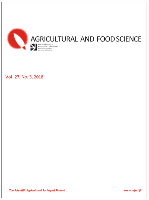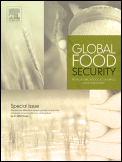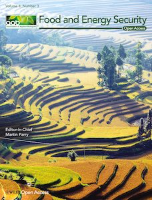
Asian Journal of Agriculture and Development
Scope & Guideline
Advancing sustainable agriculture through innovative research.
Introduction
Aims and Scopes
- Sustainable Agricultural Practices:
Research focusing on sustainable farming practices, including climate-smart agriculture, stress-tolerant crop varieties, and eco-innovation in agricultural cooperatives. - Food Security and Nutrition:
Studies that analyze household food insecurity, nutritional outcomes, and the socio-economic factors affecting food access and safety. - Rural Development and Livelihoods:
Exploration of rural transformation, including the transition from agriculture to non-agriculture occupations and the role of community-based development initiatives. - Market Analysis and Value Chains:
Investigations into agricultural value chains, competitiveness, and economic analyses of various agricultural products across different regions. - Technological Adoption and Digitalization:
Examining the impact of digital technologies and innovations in agriculture, including digitalization trends in agrifood sectors and adoption of ICT in agricultural practices. - Gender and Social Inclusion:
Research addressing gender gaps in agriculture, the role of women in farming, and the social dynamics affecting agricultural development. - Climate Change Adaptation:
Studies focused on the impacts of climate change on agriculture and adaptive strategies employed by farmers to mitigate risks.
Trending and Emerging
- Climate-Smart Agriculture:
There is a growing emphasis on climate-smart agricultural practices, reflecting the urgency of addressing climate change and its effects on food systems. - Digital Transformation in Agriculture:
Increased research on digital technologies and their applications in agriculture signals a trend towards modernization and efficiency in farming practices. - Youth Engagement in Agriculture:
Emerging studies focus on the involvement of young people in agriculture, exploring pathways into farming and addressing generational shifts in agricultural participation. - Value Chain Innovation and Analysis:
Research on value chain dynamics and innovations, particularly in specific crops and regions, is increasingly prominent, indicating a shift towards more nuanced agricultural economics. - Social Safety Nets and Food Security:
The intersection of social safety nets and food security, especially in the context of crises like COVID-19, is becoming a critical area of study. - Integrated Approaches to Rural Development:
Emerging themes highlight the need for integrated approaches that combine various aspects of rural development, including economic, social, and environmental factors.
Declining or Waning
- Conventional Agricultural Practices:
There has been a noticeable decline in research centered on traditional farming methods, as the journal increasingly emphasizes sustainable and innovative practices. - Single-Crop Farming Systems:
The focus on single-crop systems is waning in favor of more integrated and diversified farming approaches that enhance resilience and sustainability. - General Economic Policy Analysis:
Papers providing broad economic policy analyses without a specific agricultural context have become less frequent, as the journal prioritizes targeted studies that address specific agricultural challenges. - Urban Agriculture:
While still relevant, the emphasis on urban agriculture has decreased, with more attention being given to rural agricultural systems and their development. - Non-Agricultural Livelihoods:
There is a diminishing focus on non-agricultural livelihood strategies, as the journal increasingly seeks to bridge agriculture with broader development challenges.
Similar Journals

Revista Investigaciones Altoandinas-Journal of High Andean Research
Fostering interdisciplinary dialogue for a sustainable Andean future.Revista Investigaciones Altoandinas-Journal of High Andean Research is a premier open access journal that has been dedicated to advancing the knowledge of high Andean ecosystems and communities since its inception in 2013. Published by UNIV NACL ALTIPLANO and accessible globally, this journal serves as a significant platform for disseminating research findings related to the social, environmental, and economic dynamics of the Andean region. With its ISSN of 2306-8582 and E-ISSN of 2313-2957, the journal aims to foster interdisciplinary dialogue among researchers, professionals, and students committed to studying this unique geographical area. Although specific metrics such as HIndex and Scopus rankings are currently unavailable, the journal's commitment to rigorous peer review ensures the publication of high-quality research. By bridging theoretical insights with practical applications, Revista Investigaciones Altoandinas plays a crucial role in enriching perspectives on the challenges and opportunities faced by the Andean community.

Agricultura Sociedad y Desarrollo
Advancing Sustainable Practices for a Resilient SocietyAgricultura Sociedad y Desarrollo is a renowned journal published by COLEGIO POSTGRADUADOS, focusing on the intricate relationship between agriculture, society, and sustainable development. With an ISSN of 1870-5472 and an E-ISSN of 2594-0244, this journal plays a critical role in disseminating cutting-edge research and practical insights essential for advancing agricultural sciences and fostering community resilience. Although Agricultura Sociedad y Desarrollo is not open access, its commitment to quality ensures that the materials published meet rigorous academic standards, promoting innovation and collaboration among researchers, policymakers, and practitioners. Positioned in the heart of Mexico, the journal highlights regional agricultural challenges while contributing to global discussions on sustainable development. With the growing emphasis on integrating social sciences in agriculture, this journal stands out as a vital source of knowledge and discussion for those keen on enhancing agricultural practices and societal development.

AGRICULTURAL AND FOOD SCIENCE
Transforming agricultural practices through rigorous science.AGRICULTURAL AND FOOD SCIENCE is a prestigious journal published by the SCIENTIFIC AGRICULTURAL SOCIETY OF FINLAND, dedicated to advancing knowledge in the fields of agricultural and food sciences. With an ISSN of 1459-6067 and E-ISSN of 1795-1895, this open-access journal has been providing valuable insights and research findings since its inception in 2002. As of 2023, it holds a Q3 ranking in Food Science and is positioned at the 46th percentile within its Scopus category, ranking 210 out of 389 journals in Agricultural and Biological Sciences – Food Science. The journal features contributions from a global network of researchers, covering various topics including sustainable agricultural practices, food safety, and innovative food technologies. Based in Finland, the journal serves as an essential platform for scholars, professionals, and students who are committed to enhancing food security and agricultural productivity through rigorous scientific research. The convergence of interdisciplinary studies from 2004 to 2024 marks a critical evolution in the scope of agricultural and food research, making this journal a vital resource for anyone involved in these dynamic fields.

Global Food Security-Agriculture Policy Economics and Environment
Driving sustainable solutions for food security challenges.Global Food Security - Agriculture Policy Economics and Environment is a leading interdisciplinary journal published by Elsevier that addresses critical issues in food security through the lens of agriculture, economics, and environmental sustainability. With an impressive impact factor and a distinguished placement in the Q1 quartile across multiple categories including Ecology, Food Science, and Safety Research for 2023, this journal is a vital resource for researchers and practitioners aiming to address modern challenges in global food systems. Covering essential topics from agricultural policy to ecological implications, the journal provides a platform for innovative research and policy discussions that foster the advancement of food security on a global scale. Notably, it is indexed in Scopus, where it ranks in the top percentiles across its relevant categories, reflecting its significance in the field. The journal is accessible to a wide audience, making it an indispensable source of knowledge for professionals and students aiming to tackle the complex interplay between food production and environmental stewardship.

China Agricultural Economic Review
Connecting Scholars to Transform Agricultural EconomiesChina Agricultural Economic Review, published by EMERALD GROUP PUBLISHING LTD, is a premier journal that holds a significant position in the fields of agricultural economics and biological sciences. With its ISSN 1756-137X and E-ISSN 1756-1388, this journal has dedicated itself to advancing academic discourse since its inception in 2008 and continues through 2024. It boasts an impressive Q1 ranking in both Agricultural and Biological Sciences and in Economics and Econometrics, reflecting its high-quality research contributions, as evidenced by its standing in the top percentiles of Scopus rankings (97th and 92nd, respectively). Aimed at fostering scholarly exchange among researchers, professionals, and students, the journal invites original research articles, reviews, and case studies that explore vital issues and developments impacting agricultural economies, with a keen focus on both theoretical and practical advancements. As a well-regarded platform within the United Kingdom, the journal promotes accessibility and encourages significant contributions to enhance the understanding of agricultural economic dynamics worldwide.

Food and Energy Security
Innovating the Future of Food Systems and Renewable EnergyFood and Energy Security, an esteemed journal published by WILEY, is dedicated to advancing the fields of food science, agriculture, and renewable energy. Since its inception in 2012, this open-access journal has provided a platform for groundbreaking research and innovative practices that address global challenges related to food production and energy sustainability. With an impressive impact factor reflected in its Q1 quartile rankings across notable categories such as Agronomy and Crop Science and Food Science, this journal is instrumental for researchers and practitioners alike who are focused on enhancing food security and promoting sustainable energy solutions. The journal's scope encompasses multidisciplinary approaches and encourages submissions that explore the intersection of food systems and energy dynamics, ensuring relevance in the evolving landscape of environmental science and policy. By offering open access to its publications, Food and Energy Security commits to making vital research accessible, fostering informed dialogue and collaboration among scholars, policymakers, and the agrifood industry worldwide.

CABI Agriculture & Bioscience
Fostering impactful findings for a sustainable future.CABI Agriculture & Bioscience is an esteemed international journal published by SpringerNature, dedicated to advancing the fields of Agricultural and Biological Sciences, Animal Science, and Horticulture. With a strong focus on promoting Open Access research since 2020, this journal aims to disseminate scientific knowledge and innovative findings that contribute to sustainable agricultural practices and bioscience advancements. Situated in the United Kingdom, it has rapidly established itself as a premier platform, achieving impressive Q1 rankings in multiple categories, including Agricultural and Biological Sciences and Horticulture, as well as being among the top tier in Food Science. Its exceptional standing—reflected in its Scopus rankings, where it ranks in the 88th and 86th percentiles in key fields—underscores its importance to researchers, professionals, and students alike, fostering an environment for impactful collaboration and growth in the biosciences. By offering Open Access options, CABI Agriculture & Bioscience ensures that vital research is available to a broad audience, facilitating increased visibility and engagement within the global scientific community.

Temas Agrarios
Empowering Research for a Resilient Agricultural LandscapeTemas Agrarios is a premier scholarly journal focused on the dynamic field of agricultural sciences, published by the University of Córdoba, Faculty of Agricultural Sciences. Since its establishment, this journal has committed to advancing knowledge and fostering research in agricultural practices and policies, contributing significantly to the discourse surrounding food security, sustainable farming, and rural development. With an open access model implemented in 2003, Temas Agrarios ensures that critical information and research findings are readily available to the global academic community, promoting wider dissemination and accessibility. Researchers, professionals, and students can benefit from its insightful articles, which address pressing agricultural issues in Colombia and beyond, enhancing both local and international scientific dialogue. Although specific impact metrics such as H-index and Scopus rankings are not disclosed, the journal's longstanding presence underscores its importance as a platform for high-quality agricultural research.

Journal of Agricultural Sciences
Exploring the frontiers of agricultural research.Journal of Agricultural Sciences is an esteemed peer-reviewed journal dedicated to advancing research and knowledge in the field of agricultural and biological sciences. Published by Sabaragamuwa University of Sri Lanka, this journal has been an open access platform since 2005, providing valuable insights and innovative findings to a global audience. With an ISSN of 1391-9318 and an E-ISSN of 2386-1363, the journal currently holds a Q3 ranking in the Agricultural and Biological Sciences category, reflecting its commitment to maintaining high standards of scholarship. The journal's Scopus ranking places it at #102 out of 193 in its field, signifying its impact and relevance. Covering a wide range of topics from sustainable agriculture practices to advancements in biological research, the Journal of Agricultural Sciences serves as a crucial resource for researchers, professionals, and students alike, fostering knowledge exchange and promoting agricultural innovation. We invite you to explore our rich repository of research and contribute to the ongoing discourse in the vital area of agricultural sciences.

Zagadnienia Ekonomiki Rolnej
Connecting research and practice in the world of agricultural economics.Zagadnienia Ekonomiki Rolnej is a prominent journal that focuses on the economic aspects of agriculture and food industries, catering to a diverse audience of researchers, professionals, and students. Published by the respected Instytut Ekonomiki Rolnej i Gospodarki Żywnościowej – Państwowy Instytut Badawczy in Poland, this journal plays a crucial role in advancing knowledge and disseminating research findings related to agricultural economics and food policy. Although it does not currently offer open access, the journal remains a vital resource for those seeking in-depth analyses and discussions that influence agricultural practices and food security. With an ISSN of 0044-1600 and an E-ISSN of 2392-3458, Zagadnienia Ekonomiki Rolnej engages with the latest trends and challenges in the field, maintaining a strong commitment to quality research and critical discourse. Researchers and practitioners alike will find this journal an indispensable guide for navigating the complexities of agricultural economics in both national and international contexts.